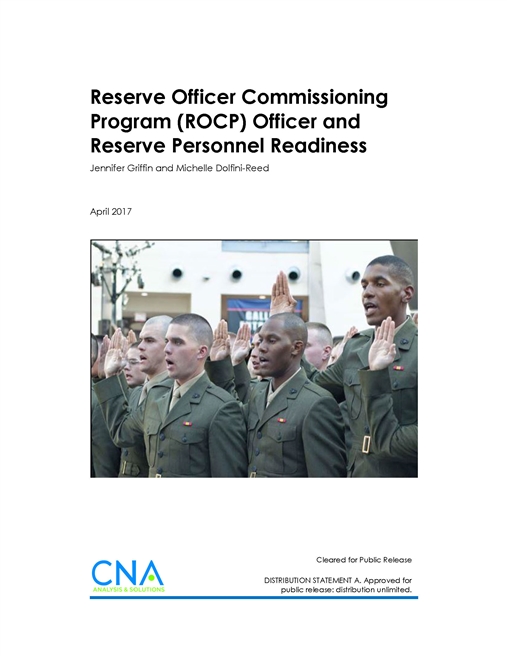In 2006, the Marine Corps created the Reserve Officer Commissioning Program (ROCP) to mitigate its Selected Marine Corps Reserve (SMCR) company-grade officer shortfalls. Before 2006, the Marine Corps relied only on officers transitioning from the active component (AC) to fill reserve component (RC) officer billets. During Operations Iraqi Freedom and Enduring Freedom, when SMCR units were being activated to support the AC, the Marine Corps had to augment these SMCR units with AC officers to staff vacant platoon leader billets—bringing the SMCR company-grade officer shortage to the attention of the Commandant of the Marine Corps. Now that the program is 10 years old, the Deputy Commandant, Manpower and Reserve Affairs, has asked CNA to analyze the performance of ROCP officers and examine the effect of the ROCP on personnel readiness. Overall, our analysis indicates that:
- ROCP officer candidates and officers perform similarly to their AC counterparts at Officer Candidate School (OCS) and The Basic School (TBS).
- The Marine Corps has a positive return on its investment in the development of ROCP officers in the form of active-duty (AD) experience tours in that ROCP officers with AD experience tend to affiliate longer than those without it.
- The ROCP has increased company-grade officer staffing, and there is a positive relationship between having lieutenants at SMCR units and enlisted nonobligors’ retention.
Although we found positive program effects, there are some areas for improvement. We recommend the following:
- Explore ways to encourage more enlisted Marines to seek reserve officer opportunities through the Meritorious Commissioning Program-Reserve (MCP- R) and the Reserve Enlisted Commissioning Program (RECP). Expanding these ROCP accession programs will help to guard against Officer Candidate Course- Reserve (OCC-R) recruiting constraints in times of AC accession growth. In addition, OCC-R prior-enlisted Marines are more likely to commission than their non-prior-enlisted OCC-R counterparts or their OCC-ground prior-enlisted counterparts, providing additional returns to investing in MCP-R and RECP expansions.
- Investigate why candidates who complete OCS do not accept commissions. We found a decreasing trend in the commissioning rate of OCC-R candidates who completed OCS. The Marine Corps may find that candidates need more information or mentoring about being a reserve officer to encourage them to accept commissions.
- Continue to offer AD experience tours and maintain an inventory of potential AD opportunities for reserve officers. These opportunities are investments into ROCP officers’ professional careers that are reaped through continued SMCR affiliation and effective reserve officer leadership. These opportunities also should be open to non-ROCP officers because they provide greater AC-RC integration.
- Monitor ROCP officers’ career progression. The ROCP is relatively young, so the Marine Corps should monitor ROCP officers’ command selection and promotion rates as more cohorts reach those career milestones to ensure that it is maximizing its return on its ROCP investments.
The ROCP has accomplished what the Marine Corps initially intended: it fills SMCR company-grade officer shortfalls. We intend for our recommendations to help that success continue and to provide reserve officers with the opportunities to achieve their Marine career aspirations.
Download reportDISTRIBUTION STATEMENT A. Approved for public release: distribution unlimited.
Details
- Pages: 86
- Document Number: DRM-2017-U-014829-Final
- Publication Date: 4/7/2017
